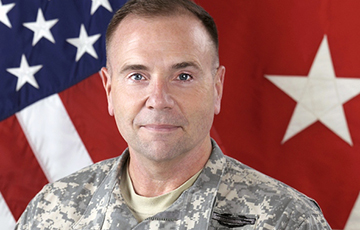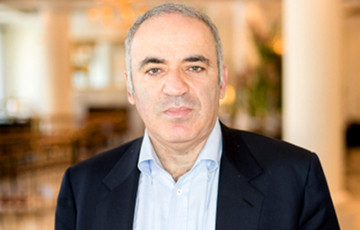General Ben Hodges On The War In Ukraine: There Comes The Culminating Point
31- 20.03.2022, 13:40
- 83,924

Russia's problems with supplies and manpower are only getting worse.
Ben Hodges, retired US Army Lieutenant General, the former commander of the US forces in Europe, the veteran of the wars in Iraq and Afghanistan, gave an exclusive interview to Charter97.org.
— Belarusians support the people of Ukraine, but do you see the danger that Lukashenka will send troops to support Putin's aggressors?
— I have not seen signs yet that the land forces of Belarus are involved. I had assumed that they might participate, but I have not seen any indication of significant participation. Maybe there are some small bits, but I just haven't seen it.
Of course, the support that Belarus provides for Russia in the form of logistics, the form of allowing Russia to operate from Belarus into Ukraine — this is unfortunate and it makes Belarus an accomplice. The government of Lukashenka is an accomplice to the murder of innocent Ukrainian people. That's what people in Belarus should understand that their government is enabling the murder of innocent Ukrainian civilians because they allow Russia to shoot from there, to operate from there, to have logistics there.
I think Belarus has several BTG (Battalion Tactical Groups). I don't know the level of readiness, how good they are. I would not imagine that they're any better than the Russian BTGs, which have so far not done so well. But still, that's numbers, and Russia is having manpower problems right now, both in casualties, but also moral problems. So, I imagine there is a pressure that Russia will turn to Belarus and say, "We need those BTGs" to at least help protect logistics, for example. or maybe to go after the Ukrainian logistics in the west. Perhaps, they might do that, but I don't know that yet.
— How serious are the losses of the Russian army in Ukraine?
— For sure, what's undisputed is that there are thousands of Russian soldiers have been killed. So, even if you take the low number, which comes from the Pentagon, 7,000 (which is an estimate) — that number is more in three weeks than what the U.S. lost in 20 years in Iraq and Afghanistan.
So, the reason I say that, even with the conservative estimate, that is a lot of dead soldiers and it comes so quickly. And then, of course, if you have that many that are killed, there's going to be a lot more that were wounded (maybe, minor, maybe, serious, who knows) — the bottom line impacts on units, impacts on their capability. And given how the Russians build the way that they fight, that probably includes a lot of leaders that have been killed, which further reduces the effectiveness of the unit. We know that at least four, maybe five generals have been killed.
Which number do I believe? Honestly, it doesn't matter. I'm always sceptical of body count because it's just normal in the confusion and in the violence, and lethality, there's a lot of estimates going on. I would normally go with the lower estimate. I saw it myself in Afghanistan: people make estimates on how many were killed, but it is not possible to count exactly.
— What about the Ukrainian side?
— I would have more confidence in reporting on the Ukrainian losses than I do on Russian losses because there are media everywhere. And so, it would be unlikely that there was a cover-up, that's not the style that I see from journalists. I'm more concerned about the numerous civilians that have been killed.
Ukraine, actually, as the defender in its own country does not have a manpower problem. They actually have as many or more soldiers in Ukraine than Russia does. So, I think that the manpower issue is not the problem for Ukraine.
— You wrote, "Next 10 days will decide the war". Why do you think that is the case?
— Clausewitz (Prussian general and military theorist - editor's note) talks about something called "the culminating point". The culminating point is this is the moment when the attacker runs out of momentum because the enemy is too strong, it doesn't have enough resources, doesn't have enough people or the soldiers lose the will to fight.
Last week, as I watched the manpower issues that Russia was beginning to experience, not just the casualties, but all the reports of personnel problems on the battlefield, and then when they reached out to Syria asking for help. That told me, they have serious problems. And then I thought about the ammunition and consumption. Of course, I don't know how many rounds they started with, how many rockets they started with. I'm sure they have thousands, but I'm sure that they did not prepare to use as much ammunition as they are. They thought this was going to be a short campaign. Ammunition is expensive, it's heavy, it's difficult to move. You have to handle it.
And we knew from our own experience, the United States, we do not have enough ammunition. We always are short, especially on certain things. So every army is short on this, unless you have prepared for it. And in wartime, the consumption of ammunition goes up much more than what you might've planned for or experienced in training. And fighting in cities, you use even more: a lot of ammunition, lots of rockets. And Russians have made the decision to smash cities, to kill people. This is a lot of what's being fired into the big cities — and they still haven't been successful yet. Mariupol, Kharkiv are destroyed, but they haven't been successful in completely capturing them yet.
So as I looked at that, I thought, "They're not going to be able to take Kyiv. They're not gonna be able to take Odesa," and their logistics problems and their personnel problems only get worse, while for Ukraine, it gets better.
My estimate is contingent on the West continuing to provide capabilities. If we don't, then my assessment obviously is going to be wrong because Ukraine will also culminate without this continuous supply of ammunition and weapons. And then also, if the Russians made a terrible decision (which would be a mistake for them), but if they were to use a chemical weapon or a nuclear weapon, that would change my assessment, as well.
— Do you see it as part of realistic military calculus on their side: to use weapons of mass destruction at a certain point?
— I want to believe — not just as a hopeful citizen, but as a professional — that there are people around him (Putin - editor's note) that are not interested in a nuclear conflict, they don't want that.
Because if my assessment is right, then the Russian General Staff already knows that. They know how many people and ammunition they have. They know their own casualties much better than I do. So, if I'm right, they will have already seen that, and they would already know what the situation is. Thus, they probably think that they will lose. There is no positive outcome. Even if Zelensky surrendered today, they would not be able to hold what they have taken. They will bleed forever. And for what? For what outcome?
So, I have to believe that they're going to say, "We're not going to allow this to go nuclear."
— So, our best hope is that some Russian generals would be strong enough not to follow a criminal order?
— Well, look, just as important as providing Stinger and Javelin and ammunition, is an information effort, aimed at Russian people, aimed at the population of Belarus to say, "Do you understand what's going on? This is not a Nazi leadership in (Ukraine - editor's note)." I know that there is a large percentage of the population that believes what they see on state TV — I understand that. But if Russian people would have the courage that the women of Belarus had, to come out — we've got to be using every possible means to reach them.
Oligarchs too, they've already lost a lot. And, I think they've got to be thinking in terms of "after Putin". They got to be thinking about life after this aggression.
— Does the West do enough in terms of military assistance to Ukraine?
— No, there needs to be more urgency. I know people are working hard, but I don't get the sense of urgency. We should be further along on delivering things. I think it was a mistake not to allow these Polish MIGs to be provided to Ukraine. I don't understand that. I think that the Biden Administration has done a good job on many things, but that was something I didn't agree with.
— Will NATO hear appeals from Ukraine for a no-fly zone?
— So far, no. I signed a letter with other people, advocating for a humanitarian no-fly zone. But I would not trust the Russians to respect it. This is where I think we have not used our strength as we could have. I don't mean going into Ukraine, but to make it clear to the Russians that they are vulnerable in many places. We could do a quarantine around their base in Tartus. We could do a snap exercise in Georgia. We could, uh, make this exercise in Norway. We could do some other things in the Arctic. I mean, we have a lot of capabilities. They're vulnerable and I don't think we're using all of our capabilities.
I am optimistic, though. Look, it is going to be terrible for more days. And it's going to take years to clean up, to recover. Years. More than 3 million refugees, they have to have something to go home to. So, it's going to require a massive effort.
Plus, as you know, Ukraine provides food for millions of people in the Middle East and Africa, even in China. Who's going to do that but it? And this is all 100% because of Putin and people who support him, like Lukashenka.
— But you are still feeling optimistic?
— I am. At the end of the day, I'm so inspired by the Ukrainian people that I am still optimistic.
On the 1st of April, 130,000 Russian families have to send their sons to become soldiers in the Russian army, 130,000. If those families knew why their son was going to be in the army where he was going to go, I think that they would not want to send their son to be cannon fodder, to be killed in Ukraine fighting in Putin's war against Ukrainians.
If just a percentage of those families said, "No way, my son is not going to support this war. I don't want to lose my son fighting in Ukraine for Putin. For what purpose?"If only 10 or 20% of those families said "No", I think that would send a powerful message to the Kremlin. And it would also give courage to those thousands of people in Russia and in Belarus who have already demonstrated courage by protesting, even knowing what was going to happen if they came out.
I think the courage of a few thousand families could save tens of thousands of lives by forcing the Kremlin to stop. This is an opportunity.











